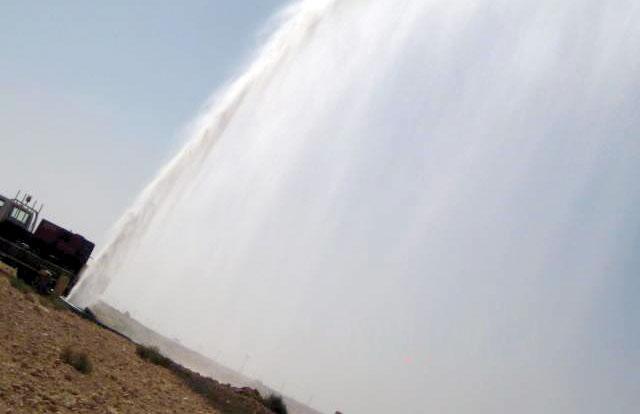You are here
Pumping via Karak’s main water carrier resumes after disruption
By Hana Namrouqa - Aug 30,2015 - Last updated at Aug 30,2015
AMMAN — Pumping via the Sultani-Ghweir carrier, the main supplier of water to Karak Governorate, resumed on Sunday after technical teams fixed the worn-out pipeline, according to government officials.
The pipeline, which transfers water from the Sultani wells to the Ghweir main water pumping station, malfunctioned last Thursday and stopped pumping for 12 hours before technical teams fixed it, an official said, noting that pumping via the same carrier stopped again on Saturday.
“The pipeline is old and worn out; it often malfunctions and forces us to stop pumping water to subscribers until the problem is fixed. Pumping resumed Sunday at noon after the pipeline was fixed,” Samer Maaytah, the head of Karak Water Directorate, told The Jordan Times.
The 34-kilometre Sultani-Ghweir carrier transfers 500 cubic metres of water per hour to the Ghweir pumping station, Maaytah said, underscoring that it supplies water to 70 per cent of Karak’s 49,000 subscribers.
Ministry of Water and Irrigation Spokesperson Omar Salameh said the ministry is planning to replace the carrier.
“Plans are currently under way to solve the problem of recurring malfunctions and water cuts,” Salameh told The Jordan Times.
Maaytah underscored that a tender for replacing the pipeline has been awarded to a local company, expecting work to replace the carrier to commence next month.
“The capacity of the carrier will be increased from 500 cubic metres per hour to 1,500 cubic metres per hour to accommodate the growing need for water,” Maaytah said.
Replacing the existing carrier with a new one will cost JD7.8 million, according to the official.
Karak, situated 120 kilometres south of Amman, has a population of 260,400 people, according to the Department of Statistics’ 2014 estimates.
The governorate is home to several of the country’s main wells, streams and dams.
Water per capita in Karak stands at 180-200 litres per day, according to the Water Ministry, which describes the amount as above average.
However, 50-60 per cent of the supplied water is lost through leakage due to violations and deteriorated water networks, pipes and pumping stations.
Related Articles
Wells and water stations in Karak Governorate resumed pumping at full capacity by Wednesday after power cuts and malfunctions disrupted water distribution, according to officials.
Water supply to Karak Governorate resumed on Wednesday after the Water Authority of Jordan (WAJ) fixed the main pipeline, which was damaged by livestock breeders the previous day, according to a government official.
AMMAN – For the third time in a week, a contractor damages a pipeline supplying thousands of consumers with water, a government official sai












